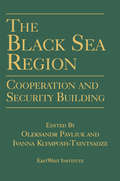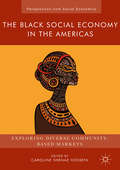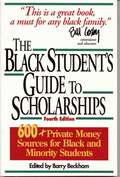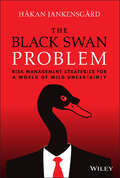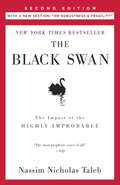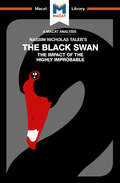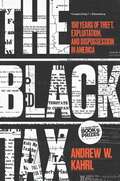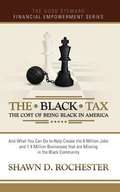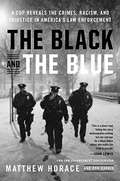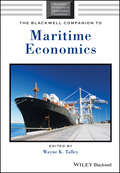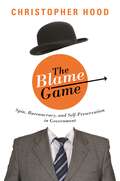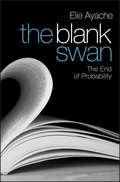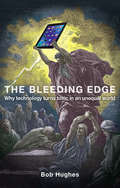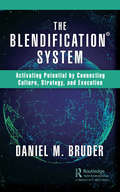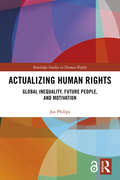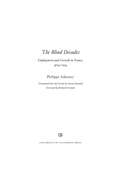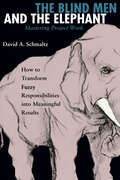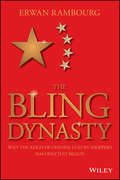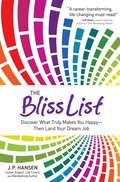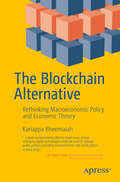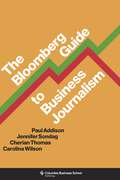- Table View
- List View
The Black Sea Region: Cooperation and Security Building
by Oleksandr Pavliuk Ivanna Klympush-TsintsadzeThe ring of countries bordering the Black Sea make up one of the unstable subregions of former Soviet republics, satellites and neighbours. This volume analyses the security issues in the Black Sea region and the development of mechanisms that would promote cooperation and conflict management.
The Black Social Economy in the Americas: Exploring Diverse Community-Based Markets (Perspectives from Social Economics)
by Caroline Shenaz HosseinThis pioneering book explores the meaning of the term "Black social economy," a self-help sector that remains autonomous from the state and business sectors. With the Western Hemisphere's ignoble history of enslavement and violence towards African peoples, and the strong anti-black racism that still pervades society, the African diaspora in the Americas has turned to alternative practices of socio-economic organization. Conscientious and collective organizing is thus a means of creating meaningful livelihoods. In this volume, fourteen scholars explore the concept of the "Black social economy," bringing together innovative research on the lived experience of Afro-descendants in business and society in Argentina, Brazil, Canada, Colombia, Guyana, Haiti, Jamaica, and the United States. The case studies in this book feature horrific legacies of enslavement, colonization, and racism, and they recount the myriad ways that persons of African heritage have built humane alternatives to the dominant market economy that excludes them. Together, they shed necessary light on the ways in which the Black race has been overlooked in the social economy literature.
The Black Student's Guide to Scholarships: 500+ Private Money Sources for Black and Minority Students
by Barry Beckham_" —Dr. Israel Tribble, Jr., President, Florida Education Fund
The Black Swan Problem: Risk Management Strategies for a World of Wild Uncertainty (Wiley Corporate F&A)
by Hakan JankensgardAn incisive framework for companies seeking to increase their resilience In The Black Swan Problem: Risk Management Strategies for a World of Wild Uncertainty, renowned risk and finance expert Håkan Jankensgård delivers an extraordinary and startling discussion of how firms should navigate a world of uncertainty and unexpected events. It examines three fundamental, high-level strategies for creating resilience in the face of “black swan” risks, highly unlikely but devastating events: insurance, buffering, and flexibility: The author also presents: Detailed case studies, stories, and examples of major firms that failed to anticipate Black Swan Problems and, as a result, were either wiped out or experienced a major strategy disruption Extending the usual academic focus on individual biases to analyze Swans from an organizational perspective and prime organizations to proactive rather than reactive action Practical applications and tactics to mitigate Black Swan risks and protect corporate strategies against catastrophic losses and the collateral damage that they cause Strategies and tools for turning Black Swan events into opportunities, reflecting the fact that resilience can be used for strategic advantage An expert blueprint for companies seeking to anticipate, mitigate, and process tail risks, The Black Swan Problem is a must-read for students and practitioners of risk management, executives, founders, managers, and other business leaders.
The Black Swan: The Impact of the Highly Improbable Fragility" (Incerto #2)
by Nassim Nicholas TalebA black swan is a highly improbable event with three principal characteristics: It is unpredictable; it carries a massive impact; and, after the fact, we concoct an explanation that makes it appear less random, and more predictable, than it was. The astonishing success of Google was a black swan; so was 9/11. For Nassim Nicholas Taleb, black swans underlie almost everything about our world, from the rise of religions to events in our own personal lives. Why do we not acknowledge the phenomenon of black swans until after they occur? Part of the answer, according to Taleb, is that humans are hardwired to learn specifics when they should be focused on generalities. We concentrate on things we already know and time and time again fail to take into consideration what we don't know. We are, therefore, unable to truly estimate opportunities, too vulnerable to the impulse to simplify, narrate, and categorize, and not open enough to rewarding those who can imagine the "impossible." For years, Taleb has studied how we fool ourselves into thinking we know more than we actually do. We restrict our thinking to the irrelevant and inconsequential, while large events continue to surprise us and shape our world. Now, in this revelatory book, Taleb explains everything we know about what we don't know. He offers surprisingly simple tricks for dealing with black swans and benefiting from them.Elegant, startling, and universal in its applications The Black Swan will change the way you look at the world. Taleb is a vastly entertaining writer, with wit, irreverence, and unusual stories to tell. He has a polymathic command of subjects ranging from cognitive science to business to probability theory. The Black Swan is a landmark book--itself a black swan. *2nd Edition, with a new essay: "On Robustness and Fragility".
The Black Swan: the Impact of the Highly Improbable
by Eric LybeckOne of the primary qualities of good creative thinking is an intellectual freedom to think outside of the box. Good creative thinkers resist orthodox ideas, take new lines of enquiry, and generally come at problems from the kinds of angles almost no one else could. And, what is more, when the ideas of creative thinkers are convincing, they can reshape an entire topic, and change the orthodoxy for good. Nassim Nicholas Taleb’s 2007 bestseller The Black Swan: The Impact of the Highly Improbable is precisely such a book: an entertaining, polemical, creative attack on how people in general, and economic experts in particular view the possibility of catastrophic events. Taleb writes with rare creative verve for someone who is also an expert in mathematics, finance, and epistemology (the philosophy of knowledge), and he martials all his skills to turn standard reasoning inside out. His central point is that far from being unimportant, extremely rare events are frequently the most important ones of all: it is highly improbable, but highly consequential occurrences – what he calls Black Swans – that have shaped history most. As a result, Taleb concludes, improbability is not a reason to act as if a possible event does not matter. Rather, it should inspire the opposite reaction.
The Black Tax: 150 Years of Theft, Exploitation, and Dispossession in America
by Andrew W. KahrlRevealing a history that is deep, broad, and infuriating, The Black Tax casts a bold light on the racist practices long hidden in the shadows of America’s tax regimes. American taxation is unfair, and it is most unfair to the very people who critically need its support. Not only do taxpayers with fewer resources—less wealth, power, and land—pay more than the well-off, but they are forced to fight for their rights within an unjust system that undermines any attempts to improve their position or economic standing. In The Black Tax, Andrew W. Kahrl reveals the shocking history and ruinous consequences of inequitable and predatory tax laws in this country—above all, widespread and devastating racial dispossession. Throughout the twentieth century, African Americans acquired substantial amounts of property nationwide. But racist practices, obscure processes, and outright theft diminished their holdings and their power. Of these, Kahrl shows, few were more powerful, or more quietly destructive, than property taxes. He examines all the structural features and hidden traps within America’s tax system that have forced Black Americans to pay more for less and stripped them of their land and investments, and he reveals the staggering cost. The story of America’s now enormous concentration of wealth at the top—and the equally enormous absence of wealth among most Black households—has its roots here. Kahrl exposes the painful history of these practices, from Reconstruction up to the present, describing how discrimination continues to take new forms, even as people continue to fight for their rights, their assets, and their power. If you want to understand the extreme economic disadvantages and persistent racial inequalities that African American households continue to face, there is no better starting point than The Black Tax.
The Black Tax: The Cost of Being Black in America
by Shawn Rochester<p>In his new book The Black Tax: The Cost of being Black in America, Shawn Rochester shows how The Black Tax (which is the financial cost of conscious and unconscious anti-black discrimination), creates a massive financial burden on Black American households that dramatically reduces their ability to leave a substantial legacy for future generations. Mr. Rochester lays out an extraordinarily compelling case which documents the enormous financial cost of current and past anti-black discrimination on African American households. <p>The Black Tax, provides the fact pattern, data and evidence to substantiate what African Americans have long experienced and tried to convey to an unbelieving American public. Backed by an exceptional amount of research, Mr. Rochester not only highlights the extraordinary cost of the discrimination that African Americans currently face, but also explores the massive cost of past discrimination to explain why after 400 years Black Americans own only about 2% of American wealth. He then establishes a framework that Black Americans and other concerned parties can use to eliminate this tax and help create the 6 million jobs and 1.4 million businesses that are missing from the Black community. <p>The Black Tax takes the reader through a complete paradigm shift that causes the reader to evaluate all forms of spending and investment in terms of the number of jobs created or businesses developed within the Black community. The Black Tax is immensely informative, thoroughly engaging and makes one of the most compelling and effective cases to commercialize Black businesses since the founding of the Negro Business League in 1910.</p>
The Black and Tans: The British Special Police In Ireland (History Press Ser.)
by Richard BennettA history of the infamous British temporary policemen sent to Ireland during the Irish War of Independence in the early 1920s.They could arrest and imprison anyone at any time. They murdered civilians. They wore a strange mixture of dark green tunics, khaki trousers, black belts, and odd headgear, including civilian felt hats. The Irish named them after a famous pack of wild dogs on County Limerick—The Black and Tans.Although they were only a small proportion of British forces in Ireland, they were the toughest, the wildest and the most feared. They knew nothing and they cared nothing about Ireland. They were sent there in March 1920 by Lloyd George’s coalition cabinet to make Ireland “a hell for rebels to live in.”Richard Bennett’s book is an accurate and authoritative account of an ugly and harrowing period in Anglo-Irish history—a period that the English have struggled to forget, and that the Irish cannot help but remember.
The Black and the Blue: A Cop Reveals the Crimes, Racism, and Injustice in America's Law Enforcement
by Matthew Horace Ron HarrisCNN contributor offers a searing indictment of America's law enforcement."This is a must-read.... Telling this story demonstrates nothing but raw courage for a black police officer who wants the truth to prevail." --John Lewis"[T]his [is a] hard-hitting, convincing indictment of the biases in today's law enforcement.... A must-read for anyone interested in understanding and solving these problems." --Booklist (starred review)Matthew Horace was an officer at the federal, state, and local level for 28 years working in every state in the country. Yet it was after seven years of service when Horace found himself face-down on the ground with a gun pointed at his head by a white fellow officer, that he fully understood the racism seething within America's police departments. Using gut-wrenching reportage, on-the-ground research, and personal accounts garnered by interviews with police and government officials around the country, Horace presents an insider's examination of police tactics, which he concludes is an "archaic system" built on "toxic brotherhood." Horace dissects some of the nation's most highly publicized police shootings and communities highlighted in the Black Lives Matter movement and beyond to explain how these systems and tactics have had detrimental outcomes to the people they serve. Horace provides fresh analysis on communities experiencing the high killing and imprisonment rates due to racist policing such as Ferguson, New Orleans, Baltimore, and Chicago from a law enforcement point of view and uncovers what has sown the seeds of violence.Timely and provocative, The Black and The Blue sheds light on what truly goes on behind the blue line.
The Black-Scholes Model
by Marek Capi Ski Ekkehard KoppThe Black-Scholes option pricing model is the first and by far the best-known continuous-time mathematical model used in mathematical finance. Here, it provides a sufficiently complex, yet tractable, testbed for exploring the basic methodology of option pricing. The discussion of extended markets, the careful attention paid to the requirements for admissible trading strategies, the development of pricing formulae for many widely traded instruments and the additional complications offered by multi-stock models will appeal to a wide class of instructors. Students, practitioners and researchers alike will benefit from the book's rigorous, but unfussy, approach to technical issues. It highlights potential pitfalls, gives clear motivation for results and techniques and includes carefully chosen examples and exercises, all of which make it suitable for self-study.
The Blackstone Group's IPO
by Josh Lerner G. Felda Hardymon Ann LeamonSteven Schwarzman, Chairman of the Blackstone Group, has just learned that an investment group associated with the government of China wants to buy the majority of Blackstone's leveraged IPO. As he considers how to respond to this offer, Schwarzman reviews the firm's proposed structure as a public entity and assesses how he might retain the delicate balance among stakeholders while still maintaining liquidity in the market.
The Blackwell Companion to Maritime Economics
by Wayne K. TalleyThe Blackwell Companion to Maritime Economics presents comprehensive and in-depth coverage of the entire scope of issues relating to shipping and port economics. Unprecedented survey of maritime economics provides full coverage of shipping and port economicsIn depth examinations offer an up-to-date study of the field including all facets of shipping, ports, logistics, and maintenance and topical discussion on security and environmental problemsPresents original theories relating to theories for maritime carriers and portsFeatures contributions from the most respected international specialists in the field
The Blame Game: Spin, Bureaucracy, and Self-Preservation in Government
by Christopher HoodThe blame game, with its finger-pointing and mutual buck-passing, is a familiar feature of politics and organizational life, and blame avoidance pervades government and public organizations at every level. Political and bureaucratic blame games and blame avoidance are more often condemned than analyzed. In The Blame Game, Christopher Hood takes a different approach by showing how blame avoidance shapes the workings of government and public services. Arguing that the blaming phenomenon is not all bad, Hood demonstrates that it can actually help to pin down responsibility, and he examines different kinds of blame avoidance, both positive and negative. Hood traces how the main forms of blame avoidance manifest themselves in presentational and "spin" activity, the architecture of organizations, and the shaping of standard operating routines. He analyzes the scope and limits of blame avoidance, and he considers how it plays out in old and new areas, such as those offered by the digital age of websites and e-mail. Hood assesses the effects of this behavior, from high-level problems of democratic accountability trails going cold to the frustrations of dealing with organizations whose procedures seem to ensure that no one is responsible for anything. Delving into the inner workings of complex institutions, The Blame Game proves how a better understanding of blame avoidance can improve the quality of modern governance, management, and organizational design.
The Blank Swan
by Elie AyacheOctober 19th 1987 was a day of huge change for the global finance industry. On this day the stock market crashed, the Nobel Prize winning Black-Scholes formula failed and volatility smiles were born, and on this day Elie Ayache began his career, on the trading floor of the French Futures and Options Exchange. Experts everywhere sought to find a model for this event, and ways to simulate it in order to avoid a recurrence in the future, but the one thing that struck Elie that day was the belief that what actually happened on 19th October 1987 is simply non reproducible outside 19th October 1987 - you cannot reduce it to a chain of causes and effects, or even to a random generator, that can then be reproduced or represented in a theoretical framework. The Blank Swan is Elie's highly original treatise on the financial markets - presenting a totally revolutionary rethinking of derivative pricing and technology. It is not a diatribe against Nassim Taleb's The Black Swan, but criticises the whole background or framework of predictable and unpredictable events - white and black swans alike - , i. e. the very category of prediction. In this revolutionary book, Elie redefines the components of the technology needed to price and trade derivatives. Most importantly, and drawing on a long tradition of philosophy of the event from Henri Bergson to Gilles Deleuze, to Alain Badiou, and on a recent brand of philosophy of contingency, embodied by the speculative materialism of Quentin Meillassoux, Elie redefines the market itself against the common perceptions of orthodox financial theory, general equilibrium theory and the sociology of finance. This book will change the way that we think about derivatives and approach the market. If anything derivatives should be renamed contingent claims, where contingency is now absolute and no longer derivative, and the market is just its medium. The book also establishes the missing link between quantitative modelling (no longer dependent on probability theory but on a novel brand of mathematics which Elie calls the mathematics of price) and the reality of the market.
The Bleeding Edge: Why Technology Turns Toxic in an Unequal World
by Bob HughesIt’s hammered into us from birth that ‘all good things come at a price’. Today, that price looks apocalyptic, with wars, exploitation and environmental collapse in every part of the globe. Some suggest that the carnage is “a price worth paying” for technological progress. No pain, no gain. But technology is precisely the business of minimising the costs and impacts of existence… and by whole orders of magnitude. By now, all human beings should be leading creative, leisure-filled lives in a pristine world of burgeoning diversity. So how did it go so wrong? In a word, inequality. In The Bleeding Edge, Bob Hughes argues that unequal societies are incapable of using new technologies well. Wherever elites exist, self-preservation decrees that they must take control of new technologies to protect and entrench their status, rather than satisfy people’s needs. Hughes pursues the latest discoveries about the effects of social inequality on human health, into the field of human environmental impact, and traces today’s ecological crisis back to the rise of the world’s first elites, 5,000 years ago. He argues that new technologies have never emerged from elites or from the clash of competitive forces, but from largely voluntary, egalitarian collaborations of the kind that produced the world’s first working computers. Finally, Hughes shows that an egalitarian world is not ‘pie in the sky' but our evolutionary homeland, the glue that holds societies together, and the “cradle of invention” from which all our best ideas emerge. The book concludes: ‘Let’s assume that the commitment to human equality that’s written into the Universal Declaration of Human Rights means exactly what it says, and take it from there.’
The Blendification System: Activating Potential by Connecting Culture, Strategy, and Execution
by Daniel M. BruderShelving Guide: Business and Management / Strategic Planning / Leadership / Operations Culture, Strategy, Execution. These three components forge the path to realized potential. The Blendification® System breaks down and rebuilds these core concepts within your company's DNA, setting the foundation for an energizing, engaging, and impactful organization. It is based on the belief that many organizations fail to maximize their potential because they simply do not comprehend the magnitude of their personal and collective untapped capabilities. Many workplaces are stuck in "second gear," not quite embracing and pursuing their full potential. Corporate missions are based on market dominance and incremental profit growth, leaving a massive blind spot in terms of the connection between employees, customers, and communities. This short-sightedness may provide a clear focal point, but it leaves the company, its leadership, and its employees with limited sustained motivation to realize potential. The Blendification® System embraces the connection between culture, strategy, and execution using the Strategy Whiteboard and integrating emotional and system intelligence into the following three-step model: Strategic Analysis including Culture Strategic Focus, Strategic Outcomes, and Strategic Actions Strategic Execution The Blendification® System connects culture, strategy, and execution in a meaningful way that fosters an inspired, exceptional workforce. By focusing on the unifying purpose within each organization, the platform promotes alignment between leadership and employees setting a clear, strong foundation in which every individual can thrive. With this foundation in place, organizations activate their employee's potential who then take care of their customers. By fully engaging those with whom organizations directly interact, these individuals then become the spark that ignites community-wide advancement. This is not a theory-based, philosophical book. This is an in-depth operating system by which organizations reshape their infrastructure to realize potential. The methodology outlined in The Blendification® System creates agile and efficient action, maximizing success in periods of economic expansion and times of uncertainty such as the COVID-19 outbreak, the Great Recession, and 9/11. By following the structure outlined in The Blendification® System and using the Strategy Whiteboard, organizations will move beyond financial success to uplifting employees, customers, and entire communities.
The Blendification System: Activating Potential by Connecting Culture, Strategy, and Execution (Routledge Studies In Human Rights Ser.)
by Jos PhilipsThis book argues that ultimately human rights can be actualized, in two senses. By answering important challenges to them, the real-world relevance of human rights can be brought out; and people worldwide can be motivated as needed for realizing human rights. Taking a perspective from moral and political philosophy, the book focuses on two challenges to human rights that have until now received little attention, but that need to be addressed if human rights are to remain plausible as a global ideal. Firstly, the challenge of global inequality: how, if at all, can one be sincerely committed to human rights in a structurally greatly unequal world that produces widespread inequalities of human rights protection? Secondly, the challenge of future people: how to adequately include future people in human rights, and how to set adequate priorities between the present and the future, especially in times of climate change? The book also asks whether people worldwide can be motivated to do what it takes to realize human rights. Furthermore, it considers the common and prominent challenges of relativism and of the political abuse of human rights. This book will be of key interest to scholars and students of human rights, political philosophy, and more broadly political theory, philosophy and the wider social sciences. The Open Access version of this book, available at: https://www.taylorfrancis.com/books/9781003011569, has been made available under a Creative Commons Attribution-Non Commercial-No Derivatives 4.0 license.
The Blind Decades
by Philippe AskenazyFrance is often described as one of the last Western economies unable to reform itself in the face of globalization. Yet its economy has not fallen by the wayside and has even resisted the great recession that began in 2008. By interlinking historical, economic, and political factors and by comparing France with other nations, this book explains the puzzle presented by the development of France. Understanding France's economy requires downplaying the usual policy injunctions--demands for less state control and less rigidity in the labor market--and instead stressing the importance of constructing a long-term industrial strategy.
The Blind Men and the Elephant: Mastering Project Work
by David A. SchmaltzIf you work, you probably manage projects every day-even if "project manager" isn't in your official title-and you know how frustrating the experience can be. Using the familiar story of six blind men failing to describe an elephant to each other as a metaphor, David Schmaltz brilliantly identifies the true root cause of the difficulties in project work: "incoherence" (the inability of a group of people to make common meaning from their common experience). Schmaltz exposes such oft-cited difficulties as poor planning, weak leadership, and fickle customers as poor excuses for project failure, providing a set of simple, project coherence-building techniques that anyone can use to achieve success. He explains how "wickedness" develops when a team over-relies on their leader for guidance rather than tapping their true source of power and authority-the individual. The Blind Men and the Elephant explores just how much influence is completely within each individual's control. Using real-world stories, Schmaltz undermines the excuses that may be keeping you trapped in meaningless work, offering practical guidance for overcoming the inevitable difficulties of project work.
The Bling Dynasty
by Erwan RambourgWhy the luxury market's fate rests in Chinese walletsThe media has negatively focused on the Chinese political administration clamping down on gifting. Observers have come to doubt the strength of Chinese consumption as the key driver for luxury. The Bling Dynasty illustrates how doubts about Chinese consumption are ill-founded and Chinese luxury demand is on the cusp of becoming dominant.This book contains the research and expert views companies need to understand and address the new challenges posed by this dominance. Each chapter brings a different perspective, covering complex aspects of luxury consumption, with illustrations and real-world examples that support the research. Readers will gain insights through interviews with brand executives, retailers, experts, and consumers.As an economic heavyweight, China is fast realizing its role in the luxury market. Chinese consumers should be accounting for more than a third of the global luxury market today, and half, if not more, in ten year's time. The Bling Dynasty runs counter to the conventional wisdom that expanding sectors become more global. Luxury is actually becoming over-dependent on Chinese sales.Readers will:Understand how Western brands developed in Asia and the challenges they are met with, notably ubiquityLearn why Chinese are purchasing luxury items abroad and what it means for the future of the sectorGain insights on why there are no Chinese luxury brands challenging Western modelsRealize that Chinese consumers are becoming similar to their American peers and that luxury competition goes way beyond pre-conceptionsChina's big spenders are increasingly mobile and this is affecting key markets. The Bling Dynasty provides new research and a comprehensive look at the booming business of luxury and the Chinese wallet.
The Bliss List
by J. P. HansenA practical and realistic guide to help you find passion in your career.What could be better than waking up every morning and looking forward to going to work? After all, most people spend the majority of their lives at work, and recent statistics reveal that four out of five people are "unhappy" in their current jobs. This is an epidemic J.P. Hansen calls The Whine Flu. The Bliss List is the cure. On a spiritual, conceptual, and practical level, The Bliss List will:* help you discover what makes you happy* help you identify skills you have and those you need to gain to achieve your goals* guide you through the important process of building a great résumé * provide actual interview questions--including off-the-wall ones--and offer the answers that nailed job offers * help you decide whether or not to accept a particular job offer when it comes along-- even if you think you must take it because you need the money
The Blockchain Alternative
by Kariappa BheemaiahExamine what would happen if we were to deploy blockchain technology at the sovereign level and use it to create a decentralized cashless economy. This book explains how finance and economics work today, and how the convergence of various technologies related to the financial sector can help us find solutions to problems, such as excessive debt creation, banks getting too big to fail, and shadow banking. The Blockchain Alternative offers sensible corrections to outdated and incorrect dogmas, such as the efficient markets hypothesis and rational expectations theory. You''ll also be introduced to universal basic income, the consequences of going cashless, why complexity economics needs to be understood and what kinds of tools and theories you''ll need to redefine the existing definition of capitalism. While the book does discuss technologies and methods that are primed for our future, a number of references are made to economic history and the works of great thinkers from a different era. You''ll see how the blockchain can be used to deploy solutions that were devised in the past, but which can serve as the antidote to our current economic malaises. You''ll discover that what is required today is not an adaptation of the old theories, but a new methodology that is suited to this new era. Without undertaking such an endeavor, one will always be burdened with a definition of capitalism that is out of kilter with the evolution of our digital humanity. What would this mean to monetary and fiscal policy, market structure and our current understanding of economics? More importantly would we need to change our current understanding of capitalism? And if we were to change our perceptions, what would the future version look like? This book answers these questions, and analyses some of the most pertinent issues of our generation. What You''ll Learn Examine fractional banking, debt, and the financialization of assets Gain a firm understanding of the "too big to fail" theory, smart contracts, and Fintech Review economics and agent-based modelling Use the blockchain and complexity economics to rethink economics and capitalistic systems Who This Book Is For The primary audience is bankers and other finance professionals, policy makers, and students of finance and economics. The secondary audience is anyone seeking a deeper understanding of the current financial system, the blockchain, and the future of capitalism. Praise for The Blockchain Alternative ". . . a bold and pioneering effort to make sense of how emerging digital technologies might be used to reshape public policies, including macroeconomic and social policies, in basic ways. Everyone interested in this very important emerging question should read this book. " - Dr. Sanjay G. Reddy, Associate Professor of Economics at The New School for Social Research and Research Associate of the Initiative for Policy Dialogue at Columbia University. "Writing on blockchain today is analogous to writing about the internet, before it became massively distributed. The book pushes us to think about the quantum leap that this technology may infer to our capitalist model, if scaled at the pace described by the book. Written with the support of strong empirical models but also with an open mind towards the future, this is a must read for anyone interested in becoming part of the new economic infrastructure" - Dr. Mark Esposito, Harvard University''s Division of Continuing Education & Judge Business School, University of Cambridge "With a rigorously balanced dosage of versatility and rationale we are allured into a multifaceted trajectory across ingrained yet functionally arcane economic models, only to plunge into a conceptually revolutionary realm which irreversibly stimulates us into envisaging a fascinating novel scheme of world order". - Ioana Surpateanu, Political Adviser to the European Parliament "If there is only one book that I am reading on how blockchain is going to change our lives, it will have to be "The Blockchain Alternativ...
The Blonde Salad
by Anat Keinan Vincent Dessain Kristina Maslauskaite Sandrine CrenerIn 2014, Chiara Ferragni, a globe-trotting founder of the world's most popular fashion blog The Blonde Salad, had to decide how to best monetize her blog as well as her shoe line called the "Chiara Ferragni Collection". A year earlier, Ferragni, together with her team, had already made a decision to transform her blog into an online lifestyle magazine and to build its positioning as a high-end brand. It meant that The Blonde Salad envisaged to only cooperate with a limited number of luxury fashion advertisers, inevitably reducing the blog's revenues. Ferragni considered changing the revenue-generating model by incorporating an online market place within The Blonde Salad, but which strategy and timeline would she need to achieve her aim? Should Ferragni's shoe line, a separate company with a different ownership structure, be merged with The Blonde Salad or was it desirable to keep the two apart?
The Bloomberg Guide to Business Journalism
by Jennifer Sondag Paul Addison Cherian Thomas Carolina WilsonThe Bloomberg Guide to Business Journalism provides students and professionals with the essential tools for reporting on companies, industries, financial markets, economies, banks, and government policies anywhere in the world. It illustrates how to chronicle capitalism for different audiences—from general consumers of business news to market specialists—and how to present compelling stories across print, web, video, and audio formats.At the heart of the book are exercises and explanations that demonstrate the most appropriate ways to cover a range of business topics. For those looking to begin careers as business journalists, the guide offers step-by-step instructions for reporting and breaking news, emphasizing high standards for accuracy and fairness. Readers will learn key questions to ask when interviewing executives, how to interpret a company financial statement, why markets move, and much more.An engaging and easy-to-understand storyline set in a fictional “Businessworld” accessibly conveys key concepts. The book offers clear advice on reporting, writing, editing, and producing multimedia content for today’s busy readers, listeners, and viewers. Chapters can be used for individual study or university instruction, and material can be customized for settings from a weeklong workshop to a full semester course.This authoritative book shows readers how to excel in business journalism and related communication fields at a time when the media landscape is changing rapidly and dramatically.
